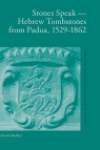Stones Speak

This book is about the birth of Christianity. Its perspective, however, is a Jewish one. It suggests that Christianity, as a discrete religious entity, distinct from Judaism, was born, among many other things, out of a complicated and dynamic social and discursive process of both seclusion and exclusion, in which various Jewish groups, among which were also the followers of Jesus, were introduced under the rabbinic category of minim, and were thus produced by rabbinic discourse as “others,” as “non-Jews.”
In early rabbinic parlance, minim is a broad term for different Jewish groups, who were considered by the rabbis as having secluded themselves from the community, and social separatism (or any indication of a tendency toward separatism) is termed minut. This book’s argument is that the emergence of the rabbinic discourse of minut was a response to an identity crisis of a posttraumatic society, shattered by the powerful Roman empire. In order to reaffirm its values and distinct Jewish identity Palestinian rabbinic society developed a discourse of “separatism,” in which its boundaries were reestablished by the labeling of some Jews as minim, and their placement beyond the pale. Initially, it is argued, Christianity played only a very modest role in that process, and the early Christians were introduced into the category of minim and became to be considered as such only gradually. Throughout Late Antiquity, the “significant other” for Palestinian rabbis remained the Roman empire, and one of the religious issues with which they were most occupied was the empire’s power and the religious challenge that it posed to God’s sovereignty.
Last Updated Date : 30/11/2014



